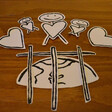Arts and Culture 29 March 2012

Audre Lorde, Meridel Lesueur, and Adrienne Rich in 1980 at a writing workshop in Austin, Texas.
American poet, activist and teacher Adrienne Rich passed away yesterday at age 82. She is one of the most influential poets of the late 20th century.
In the 1960s, she was involved in anti-war and women’s, black and queer liberation struggles, and her poetry engaged these issues. During the Clinton Administration in 1997, Rich famously refused the National Medal of the Arts, writing:
There is no simple formula for the relationship of art to justice. But I do know that art–in my own case the art of poetry–means nothing if it simply decorates the dinner table of power which holds it hostage. The radical disparities of wealth and power in America are widening at a devastating rate. A President cannot meaningfully honor certain token artists while the people at large are so dishonored.
Her 1980 essay “Compulsory Heterosexuality and Lesbian Existence” challanged second-wave feminists to see heterosexuality in practice as a kind of sexual inequality and a characteristic of men’s power over women. Addressing her feminist peers in the essay, she writes:
Feminist theory can no longer afford merely to voice a toleration of “lesbianism” as an “alternative life-style,” or make token allusion to lesbians. A feminist critique of compulsory heterosexual orientation for women is long overdue.
She adds:
I am suggesting that heterosexuality, like mother-hood, needs to be recognized and studied as a political institution–even, or especially, by those individuals who feel they are, in their personal experience, the precursors of a new social relation between the sexes.
Breaking Zionist taboos, supporting the boycott
During her activist career, Adrienne Rich was involved with New Jewish Agenda which broke Zionist taboos around Palestinian existence and right to speak. In 2009, she endorsed the Palestinian call for academic and cultural boycott of Israel despite having reservations:
Until now, as a believer in boundary-crossings, I would not have endorsed a cultural and academic boycott. But Israel’s continuing, annihilative assaults in Gaza and the one-sided rationalizations for them have driven me to re-examine my thoughts about cultural exchanges. Israel’s blockading of information, compassionate aid, international witness and free cultural and scholarly expression has become extreme and morally stone-blind. Israeli Arab parties have been banned from the elections, Israeli Jewish dissidents arrested, Israeli youth imprisoned for conscientious refusal of military service. Academic institutions are surely only relative sites of power. But they are, in their funding and governance, implicated with state economic and military power. And US media, institutions and official policy have gone along with all this.
Adrienne Rich’s essay “Someone is Writing a Poem” considers the power and constraints of art to intervene in politics, and is a crucial read for any artist-activist.
In paradise every
the desert wind is rising
third thought
in hell there are no thoughts
is of earth
sand screams against your government
issued tent hell’s noise
in your nostrils crawl
into your ear-shell
wrap yourself in no-thought
wait no place for the little lyric
wedding-ring glint the reason why
on earth
they never told you
Wait (2006).




